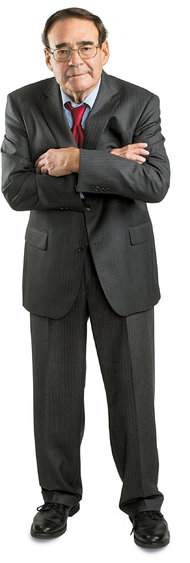You’ve been called one of the most dreaded private investigators in the world. What was it like to serve Nixon with a subpoena?
I did not think, when I started the investigation into the Watergate break-in, that it was going to reach anybody in the White House, at any level. I went into the investigation with a completely open mind. I wrote the subpoena myself. When I walked through the West Wing with it, people were saying, “Great work, Terry, keep it up.” I thought that was interesting.
Talk
Terry Lenzner on Tricky Dick and Dirty Tricks
Interview by AMY CHOZICK
Published: October 18, 2013

Stephen Voss for The New York Times
Terry Lenzner
Related
In your new book, “The Investigator,” you describe aggressively snuffing out leaks during Watergate. Are the press just pawns in your investigations?
They are definitely not pawns. Watergate was aberrational because Congress thrust us into it; it didn’t come from some previous assignment or anything like that. I tried to prevent leaks because I thought they would alert people to our investigative strategy.
But then, after Watergate, you used reporters as investigators. Why?
Bernstein and Woodward made me realize that reporters had a lot of talent, and they were able to do things that law-enforcement guys couldn’t. So we started turning to investigative reporters because we felt they were more relaxed and had a good rapport with people.
In the ’90s, you worked for Bill Clinton so much that people called you his secret police.
We didn’t have that kind of relationship with the president. We did work for him — or his lawyers, I should say — but it had nothing to do with investigating any particular person.
You’ve been accused of using dirty tactics in your investigations.
I don’t know what you’re talking about.
While representing Oracle, your company paid janitors to give you garbage from companies aligned with Microsoft.
That was not exactly a dirty trick. They gave up their possession and ownership of this material when they threw it away in the garbage can. It may be unseemly, but it’s perfectly legal.
Has the Internet changed your business?
In the industry, we must continue to be careful about what we report as factual. I worry about people going to their computers and bringing up publicly available information and assuming that it’s all accurate.
Tell me about your “throw-up test.”
If you can’t go into a courtroom and describe how you got your information without the judge and the jury throwing up, you can’t continue doing what you’re doing.
You were investigating the journalist and serial fabricator Stephen Glass and found out he wrote a profile about you. That’s a weird coincidence.
I went down to The New Republic offices to go through his desk and computer. There was this letter from George magazine. I flipped it over, and there was a check with an article that Glass had written about me. I had never spoken to him. I read the thing, and I said: “You can’t fire this guy. This is the nicest thing that’s been written about me in two years.”
You’re known for getting your clients what they want. That didn’t work out with Dodi Fayed’s father.
Fayed’s son and Princess Diana were killed because of a drunk driver who had been working for Fayed. The father wanted to unearth a conspiracy between the royal family and the secret services in France and the U.K. to kill Diana and his son before they became married. I told him we could find no credible evidence to support his theory, and he fired me.
Does the job affect your family life?
As a joke, whenever my daughter brought home a date, I would give the applicant a glass of wine or a beer, and then I’d tell him that at the end of the day we were sending the glass to the lab to get his prints for a background check.
As a private investigator, do you end interviews by asking if there’s anything else?
Yes, we do that.
O.K., is there anything I should know?
No, you have exhausted me.









